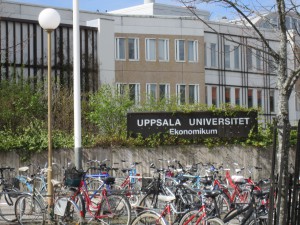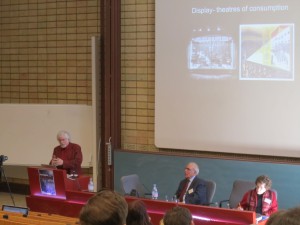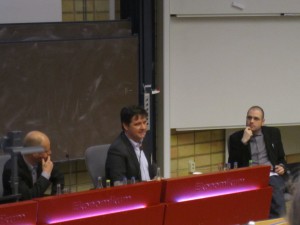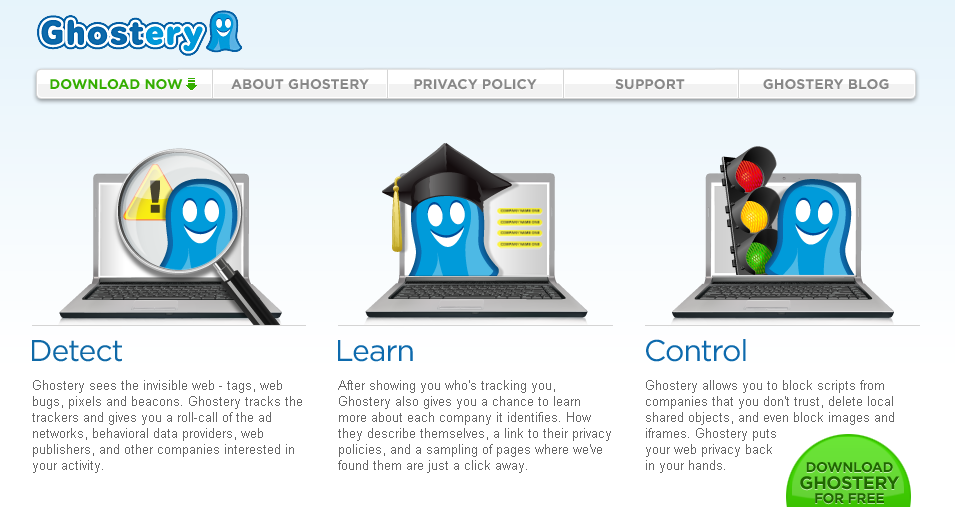..on my desk. Hope I’ll have time to read them —> SOON!!!
Author Archives: astrid
#ITAwien @ knappenhof
I spent the first days of the week in a wonderful hotel in the middle of Austrian nowhere; or more specifically: in the hotel Knappenhof, close to Reichenau half-way on the Rax. A picture describes the place the best, I guess.

The reason for this trip to the countryside was my first “ITA Klausur”, which annually takes place in June. The major task of our intense three-day meeting was a kind of self-discovery in times of budget cuts and precarious futures. The SOS ÖAW initiative speaks for itself. Despite these challenges – or maybe even because of them – we had very productive discussions on mission statements, PR work, academic work flows and policy advice, evaluation criteria of scientific and consulting achievements, discrepancy between long-term measures and short-term goals, integration of different employment contracts, perspectives and needs, and – last but not least – the very nature of technology assessment and its role in academia, society and the policy realm. 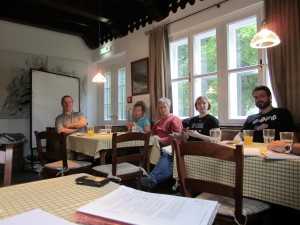 We finally made a list of different tasks and identified measures how to reach them in due time.
We finally made a list of different tasks and identified measures how to reach them in due time.
Even though a lot of work lies ahead of us the atmosphere and general “vibes” were really positive and motivating. The ITA culture of communication seems to be pretty inclusive, democratic and well balanced. Having just started my job in March, and hence still being an ITA “novice”, I felt very welcome and integrated. The Klausur was a really good opportunity to gain insights in both ITA dynamics and the nitty-gritty of technology assessment! (Hopefully the weather will be better next time!)
Algorithmic ideology on science.orf.at
The interview I gave last week for science.ORF; a website of the Austrian TV broadcast, is online now. Thanks to Lukas Wieselberg!! Here’s the abstract (in German):
Die Ideologie des Algorithmus
 Die Sozialwissenschaftlerin Astrid Mager hat untersucht, wie Google, Bing und andere Suchmaschinen entstehen. Im Mittelpunkt standen dabei nicht die Technologien, sondern die Werte, die hinter der Entwicklung stecken. Die “Ideologie des Suchalgorithmus” ist Ausdruck des gegenwärtigen Kapitalismus, sagt Mager.
Die Sozialwissenschaftlerin Astrid Mager hat untersucht, wie Google, Bing und andere Suchmaschinen entstehen. Im Mittelpunkt standen dabei nicht die Technologien, sondern die Werte, die hinter der Entwicklung stecken. Die “Ideologie des Suchalgorithmus” ist Ausdruck des gegenwärtigen Kapitalismus, sagt Mager.
© photo credit: EPA/ science.orf
=> read the full story on science.orf.at.
issue mapping online / london
That’s how issue mapping looks like when new media scholars from Goldsmiths, Sociology/ London and the Digital Methods Initiative/ Amsterdam meet. Rather than lectures and passive entertainment the workshop consisted of hands-on projects carried out on site and actual work. As always, a highly enjoyable exercise! 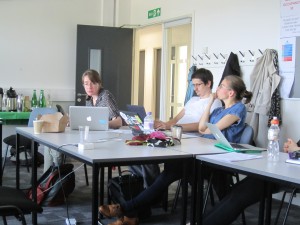 Compared to the Digital Methods Summer School annually taking place in Amsterdam more “issue experts” – from the Open Society Foundations, for example – were involved this time. Their practical knowledge and expertise in certain issue areas clearly stimulated the discussions since issue mapping requires both software tools/ visualization techniques AND background knowledge on the object of study – be it climate change, ageing or privacy. Only the combination of “digital methods” and “issue expertise” produces new insights and findings in my opinion (even though we didn’t carry out the Turing test to proof this hypothesis 😉 )
Compared to the Digital Methods Summer School annually taking place in Amsterdam more “issue experts” – from the Open Society Foundations, for example – were involved this time. Their practical knowledge and expertise in certain issue areas clearly stimulated the discussions since issue mapping requires both software tools/ visualization techniques AND background knowledge on the object of study – be it climate change, ageing or privacy. Only the combination of “digital methods” and “issue expertise” produces new insights and findings in my opinion (even though we didn’t carry out the Turing test to proof this hypothesis 😉 )
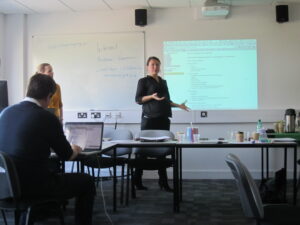 The workshop was organized by Noortje Marres & Carolin Gerlitz – both from Goldsmiths. It is well documented on the website issuemapping.net (including the workshop agenda, readings and a box of tools and tactics for “Issue Mapping Online”). A second workshop is planned for the fall; not least to think about future projects and further software developments; since issue mapping means constant experimentation with and refinements of the methods at hand.
The workshop was organized by Noortje Marres & Carolin Gerlitz – both from Goldsmiths. It is well documented on the website issuemapping.net (including the workshop agenda, readings and a box of tools and tactics for “Issue Mapping Online”). A second workshop is planned for the fall; not least to think about future projects and further software developments; since issue mapping means constant experimentation with and refinements of the methods at hand.
4th ICTs and Society-Conference 2012 or “marx is back”
Last week I attended an excellent conference in Uppsala/ Sweden organized by Christian Fuchs and colleagues. The conference was concerned with “Critique, Democracy, and Philosophy in 21st Century Information Society” (all conference abstracts could be found online) or “Marx is Back”, as the opening panel suggested. Accordingly, numerous scholars from various disciplines – old and young – discussed Marx, Marcuse, and many other thinkers in the tradition of Critical Theory in the context of new media and Internet technologies. In fact, developing critical theories of social media was the main purpose of the gathering.
Contrary to other Internet-related and social media events, this conference was hence saturated with philosophy, theory and critical thinking. Theoretical papers were mixed up with empirical studies scrutinizing corporate Internet services including big players like Google, Facebook and co., but also alternative technologies such as Diaspora, Crabgrass and others. Issues discussed ranged from user exploitation, commodification of social relations, free labour, knowledge workers, crowdsourcing of surveillance, privacy, data protection, ideologies, capitalist modes of production, creation of surplus value in the digital age, pratices of resistance, revolution, social movements, ethics 2.0, circuits of struggle, the commons, participation, and the long march towards a sustainable, democratic information society.
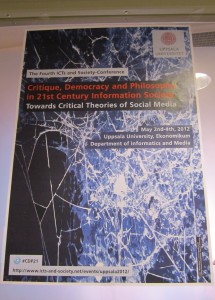 The line-up of keynote speakers was impressive! I particularly enjoyed the following lectures: by Vincent Mosco, who posed the central question whether knowledge workers will unite and suggested to focus on strategies and tactics for activism. By Graham Murdock, who talked about the privatization of the commons and the promotional enclosure of everyday life. By Charles Ess, who analyzed privacy and collective property in the context of Western and Eastern developments. By Christian Fuchs, who underlined – once again – that Marxian thinking is crucial in contemporary informational capitalism and hence advised Castells and Jenkins to read Marx in order to develop more critical concepts. By Trebor Scholz, who talked about the Internet as playground and factory and pictured us, the users, as “renting the product of our own labour” and demanded hybrid (public/ private) solutions for the future. By Mark Andrejevic, who made us think about the “big data divide”, predictive analytics, and the question who has access to big data (corporations) and who has not (e.g. researchers). By Andrew Feenberg, who conceptualized the Internet as a site of struggle between the consumption model and the community model and suggested (following Marcuse) to “enter the institutions and contest them from within” – whether that would also include entering corporations and contesting them from within remained open though. For the keynote talks I didn’t mention – because I missed and/ or treated them shabbily see Christian Fuchs’ comprehensive article on the tripleC website (Journal for a Global Sustainable Information Society).
The line-up of keynote speakers was impressive! I particularly enjoyed the following lectures: by Vincent Mosco, who posed the central question whether knowledge workers will unite and suggested to focus on strategies and tactics for activism. By Graham Murdock, who talked about the privatization of the commons and the promotional enclosure of everyday life. By Charles Ess, who analyzed privacy and collective property in the context of Western and Eastern developments. By Christian Fuchs, who underlined – once again – that Marxian thinking is crucial in contemporary informational capitalism and hence advised Castells and Jenkins to read Marx in order to develop more critical concepts. By Trebor Scholz, who talked about the Internet as playground and factory and pictured us, the users, as “renting the product of our own labour” and demanded hybrid (public/ private) solutions for the future. By Mark Andrejevic, who made us think about the “big data divide”, predictive analytics, and the question who has access to big data (corporations) and who has not (e.g. researchers). By Andrew Feenberg, who conceptualized the Internet as a site of struggle between the consumption model and the community model and suggested (following Marcuse) to “enter the institutions and contest them from within” – whether that would also include entering corporations and contesting them from within remained open though. For the keynote talks I didn’t mention – because I missed and/ or treated them shabbily see Christian Fuchs’ comprehensive article on the tripleC website (Journal for a Global Sustainable Information Society).
The parallel sessions were yet not less interesting! (Again, the list won’t be complete since I didn’t attend all of them.) I liked the “Antagonistic Lives of Knowledge Workers” and its discussions on knowledge struggles on web 2.0 platforms (Brian Loader), affective labour and self-promotion of young academics on Twitter, Blogs & Facebook (Mike Frangos) and Romanian journalism in a digital era (Romina-Gabriela Surugiu). “Surveillance 2.0” featuring an excellent talk on the ideological packaging of ICTs (Heidi Herzogenrath-Amelung and Pinelopi Troullinou), empirical case studies on social media use & privacy in Austria (Verena Kreilinger and Thomas Allmer) and, last but not least, a presentation on theorizing social media policing mentioning amazing – and truly frightning – cases of crowdsourcing surveillance such as the Internet Eyes in the UK (Daniel Trottier). Finally, my own panel “Commodification and Ideology” was really cool; covering, among other issues, time conflicts and global capitalism (Wayne Hope), corporate social (ir)responsibility and its problems (Marisol Sandoval), and the alienated labour of academic publishing (Wilhem Peekhaus). Moreover, I got great feed-back and food for thought after my own presentation on algorithmic ideology including comments on hierarchical features of Žižek’s theory and the need for democratic algorithms and alternative (net) politics – Christian Fuchs would call it Communism, I suppose.

 Accordingly, at the conference dinner the Internationale was played and everyone stood up to it. A truly amazing conference, as I said. Thanks to everyone – Christian, Marisol, … – who made this event happen!!! I’ll be there for the next one (assuming there is another ICTs & society conference since there were other events in the past; see once again Christian’s review)! Finally, it was great meeting Ramon Rodriguez-Amat and Katharine Sarikakis from the Communication Studies department in Vienna (let’s unite indeed!!!) & it was fun hanging out with Mike in Stockholm.
Accordingly, at the conference dinner the Internationale was played and everyone stood up to it. A truly amazing conference, as I said. Thanks to everyone – Christian, Marisol, … – who made this event happen!!! I’ll be there for the next one (assuming there is another ICTs & society conference since there were other events in the past; see once again Christian’s review)! Finally, it was great meeting Ramon Rodriguez-Amat and Katharine Sarikakis from the Communication Studies department in Vienna (let’s unite indeed!!!) & it was fun hanging out with Mike in Stockholm.
“Black Box Suchmaschine” Video Archive
Yesterday we had a great event at the Museumsquartier in Vienna: our “Themenabend Black Box Suchmaschine” (see program below). For those who missed the event and can’t wait to watch it online (or parts of it 😉 ) we archived the video stream here:
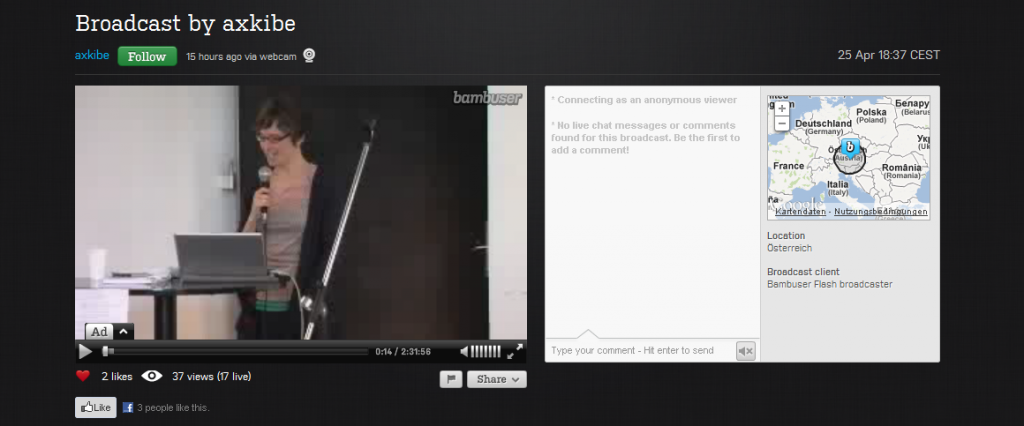 Thanks to Axel Kittenberger for the technical support & the stream! & everyone, who participated and made this evening a great contribution to the politics of search, modes of ordering knowledge, privacy and regulation (which triggered a heated debate, as you can see towards the end of the video)..
Thanks to Axel Kittenberger for the technical support & the stream! & everyone, who participated and made this evening a great contribution to the politics of search, modes of ordering knowledge, privacy and regulation (which triggered a heated debate, as you can see towards the end of the video)..
Finally, René König presented the newly formed network Re:Search – a mailinglist established in co-operation with the Institute of Network Cultures, Amsterdam (Geert Lovink). Subscribing to the list is only the first step, further activities will follow – Blog posts on the Society of the Query Blog, events, a publication hopefully! So stay tuned 😉
Out of Control – What the Web Knows about You
 Yesterday I’ve attended the opening of the new Ars Electronica exhibition “Out of Control”. According to its website the exhibition aims at “demonstrating what exactly is being captured in conjunction with telecommunications data retention and all the interesting information about us that online services like Facebook and Google just happen to be amassing. Exhibition visitors will also find out what steps they can take to protect their privacy.” Concretely, visitors were presented with a range of installations, visualizations and talks about digital data, “user profiles”, privacy and techniques of digital self defense. Information to all these works could be found online.
Yesterday I’ve attended the opening of the new Ars Electronica exhibition “Out of Control”. According to its website the exhibition aims at “demonstrating what exactly is being captured in conjunction with telecommunications data retention and all the interesting information about us that online services like Facebook and Google just happen to be amassing. Exhibition visitors will also find out what steps they can take to protect their privacy.” Concretely, visitors were presented with a range of installations, visualizations and talks about digital data, “user profiles”, privacy and techniques of digital self defense. Information to all these works could be found online.
I particularly liked the piece Surveillance Awareness Database (SAD) by the Technical University Vienna.  It’s a website that allows users to upload photos and coordinates of surveillance cameras to create a digital map showing all surveillance cameras in the region. Further, the piece Handytracking was quite cool. Malte Spitz, a member of the German Green Pary and an opponent of the data retention law, forced T-Mobile to release all data stored about him from August 2009 to February 2010. The result is an impressive graphic that provides “highly detailed information about where Malte Spitz was, when and how long he was there, how often he called someone or was called by others, how many SMSs he wrote and how much time he spent online. Combined with his Tweets and blog entries, this data coalesces into a comprehensive picture of what Malte Spitz was up to.” You may watch the animated image on the Zeit.de Website.
It’s a website that allows users to upload photos and coordinates of surveillance cameras to create a digital map showing all surveillance cameras in the region. Further, the piece Handytracking was quite cool. Malte Spitz, a member of the German Green Pary and an opponent of the data retention law, forced T-Mobile to release all data stored about him from August 2009 to February 2010. The result is an impressive graphic that provides “highly detailed information about where Malte Spitz was, when and how long he was there, how often he called someone or was called by others, how many SMSs he wrote and how much time he spent online. Combined with his Tweets and blog entries, this data coalesces into a comprehensive picture of what Malte Spitz was up to.” You may watch the animated image on the Zeit.de Website.
Moreover, the pieces Faceless, Face to Facebook and the, by now well known, initiative Europe vs. Facebook are worth mentioning. Manu Luksch used surveillance cameras to produce a movie.  The filming was done by surveillance cameras in London. Right after all the scenes were captured the artist claimed her right to obtain all footage in which she appeared. For the piece Face to Facebook Paolo Cirio and Alessandro Ludovico “harvested a million Facebook profiles, filtered them with facial recognition software, and then grouped them according to similarities of the data as well as the faces. Finally, the profiles reordered in this way were displayed on a dating site the duo set up, and the profiled individuals were introduced to each other via e-mail.” Finally, Max Schrems presented his Europe vs. Facebook project on a really huge screen. The law student asked Facebook to send him all his data the company holds. Thereafter he filed a number of complaints with the Irish Data Protection Commission since Facebook is running an Irish Company to benefit from tax advantages. If you’re interested in how far Max and his colleagues got so far check their really informative website.
The filming was done by surveillance cameras in London. Right after all the scenes were captured the artist claimed her right to obtain all footage in which she appeared. For the piece Face to Facebook Paolo Cirio and Alessandro Ludovico “harvested a million Facebook profiles, filtered them with facial recognition software, and then grouped them according to similarities of the data as well as the faces. Finally, the profiles reordered in this way were displayed on a dating site the duo set up, and the profiled individuals were introduced to each other via e-mail.” Finally, Max Schrems presented his Europe vs. Facebook project on a really huge screen. The law student asked Facebook to send him all his data the company holds. Thereafter he filed a number of complaints with the Irish Data Protection Commission since Facebook is running an Irish Company to benefit from tax advantages. If you’re interested in how far Max and his colleagues got so far check their really informative website.
Since my new project Glocal Search is concerned with search engines, data protection and related issues as well I got in touch with Christoph Kremer, one of the heads of Ars Electronica Center. This morning we had a very nice discussion and decided that we – me and my colleagues from ITA – will present selected projects concerned with technology and society as part of the AEC fall program. I’m very excited about this outcome and I’m already looking forward to this event. Thanks Ars Electronica for some inspiring hours in the past few days! I’ll definitely return..
(Credits for all images: Ars Electronica)
Themenabend: Black Box Suchmaschine, 25.4.2012, 18.30, MQ/ Raum D
I’m already looking forward to the event “Black Box Suchmaschine. Google & co. im gesellschaftspolitischen Kontext” I’m organizing together with René König (in cooperation with our research group Internet Research).
Here’s the abstract & the program featuring great speakers!!! (in German)
Termin: 25.04.2012, 18.30
Ort: Museumsquartier Wien, Raum D
Zudem Online-Anbindung durch Streaming und/oder Microblogging.
(Image credit: Anja Goller. Something interesting..)
Suchmaschinen wie Google prägen das Netz wie kaum ein anderer Dienst. Zwar gewinnen soziale Netzwerkseiten wie Facebook zunehmend an Bedeutung, doch werden Nutzungsstatistiken noch immer von Suchmaschinen dominiert. „Googeln“ ist eine alltägliche Praxis geworden, die nur selten hinterfragt wird. Dabei strukturieren Suchmaschinen unseren Zugang zu Netzinformationen maßgeblich. In der Privatwirtschaft ist diese Erkenntnis längst etabliert und Firmen geben viel Geld für sogenannte Suchmaschinenoptimierung aus. Aus gutem Grund, denn bisherige Nutzungsforschung zeigt deutlich, dass mehrheitlich den hierarchischen Ordnungen der Ergebnislisten gefolgt wird. Gleichzeitig wird dabei häufig eine fragwürdige Datenpolitik betrieben, die immer wieder für Kontroversen sorgt. Erst kürzlich hat sich etwa Google mit seinen geänderten Nutzungsbedingungen wieder ins Zentrum des öffentlichen Interesses katapultiert. Denn seit März müssen angemeldete NutzerInnen zustimmen, dass das Unternehmen umfangreiche User-Daten aus seinen verschiedenen Diensten (dazu gehört nicht nur Google Web Search sondern auch beispielsweise Google Maps, Google Mail, YouTube, Google+ uvm.) zusammenführt, was DatenschützerInnen auf die Barrikaden steigen lässt. Entsprechend kommt Suchmaschinen wie Google eine erhebliche gesellschaftspolitische Bedeutung zu, mit der sich unser Themenabend „Black Box Suchmaschine“ aus unterschiedlichen Blickwinkeln auseinander setzen möchte. Dazu geben WissenschaftlerInnen Einblicke in aktuelle Forschungen, die wir zur Diskussion stellen wollen. Schließlich wird im Anschluss das Netzwerk „[Re]Search“ gegründet, an dem sich alle Interessierten beteiligen können.
Programm
18.30 Begrüßung
18.35 Keynote:
Asymmetrische Beziehungen – Klassifizierungskämpfe in Informationsgesellschaften
Konrad Becker
Institut für neue Kulturtechnologien & World-Information.Org (Wien)
18.50-19.30 Block 1: Wie Suchmaschinen unser Wissen gestalten
Ganz persönlich? Alte und neue Soziometriken der Suchmaschinen
Katja Mayer
Universität Wien, Wissenschaftsforschung
Das suchende Individuum – Subjektive Perspektiven zwischen globalen Strukturen und Personalisierung
René König
Karlsruher Institut für Technologie
Vertrauen, Diversität und Empfehlungssoftware
Judith Simon
Universität Wien / Karlsruher Institut für Technologie
19.30-20.10 Block 2: Wie Google & co. mit unseren Daten Geld verdienen
Suche und Werbung: Fundamentale Interessenkonflikte im Google-Empire
Bernhard Rieder
Universität Amsterdam
Suchmaschinen im Spannungsfeld von globaler Informationsökonomie und lokaler Gesellschaftspolitik
Astrid Mager
Österreichische Akademie der Wissenschaften
Auf der (Web-)Suche nach der informationellen Selbstbestimmung – Privacy by Design als Regulierungsansatz?
Jaro Sterbik-Lamina, Stefan Strauß
Österreichische Akademie der Wissenschaften
20.10 Podiumsdiskussion
Moderierte Podiumsdiskussion mit Publikumseinbindung (auch online) zu quer liegenden Fragen der präsentierten Themenschwerpunkte. Anschließend Gründung des Netzwerks [Re]Search für alle Interessierten.
verfassungsklage.at
I just filled in, printed, signed and sent out the online form provided on the website verfassungsklage.at (initiated by AKVorrat & the Austrian Green Party). It should help to topple the data retention law by bringing it to the Austrian constitutional court. This may not necessarily bring down data retention in the whole European Union, but it’s a first step. The more countries resign from the law, the more likely the EU will reconsider this terrible law, which severely intervenes in fundamental rights. If you agree that Austria should follow the countries Germany, Czech Republic, Bulgaria and Romania in bringing down the law, then quickly go to the website and follow the instructions:
Ghostery & more
Last week I attended the Unlike Us conference in lovely Amsterdam. The event, aimed at bringing together researchers, activists and artists concerned with Social Media Monopolies and their Alternatives, was covered pretty well by bloggers on site, as you can see here. Instead of repeating their work by blogging about the whole event, I just want to point you to a single tool I learned about: Ghostery.
Ghostery helps you tracking the trackers and gain back control over your privacy. “Ghostery tracks the trackers and gives you a roll-call of the ad networks, behavioral data providers, web publishers, and other companies interested in your activity.”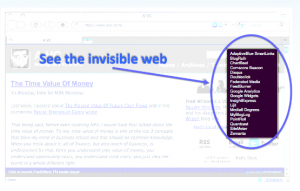 It’s a browser plug-in (for various browsers) that shows you the invisible web – tags, web bugs, pixels and beacons that are included on web pages in order to get an idea of your online behavior – and helps you to block and/ or manage them. Instead of passively running in the background, the app brings them to the foreground, and hence puts you in the active position of handling them. You should really check it out, it’s the best privacy tool I’ve seen in a really long time!!!
It’s a browser plug-in (for various browsers) that shows you the invisible web – tags, web bugs, pixels and beacons that are included on web pages in order to get an idea of your online behavior – and helps you to block and/ or manage them. Instead of passively running in the background, the app brings them to the foreground, and hence puts you in the active position of handling them. You should really check it out, it’s the best privacy tool I’ve seen in a really long time!!!
Besides, it was very interesting to see Max Schrems talking about Facebook vs. Europe. He’s an Austrian law student, but pretty professional in what he does. I hope he manages to bring Facebook to its knees! Blogpost on his talk here.
Finally, I attended the Oxford Internet Institute (OII) conference “Interdisciplinary Insights on the Social Science of Digital Research”, where I talked about the Performative Character of Digital Methods (see blog post below). It was a great event, which covered a range of digital methods and their ethical implications. I particularly enjoyed seeing Mike Thelwall talking about his network mapping tools since I’ve read about his work for quite some time now.


